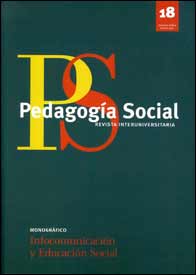Hacia la Educación Intercultural.
DOI:
https://doi.org/10.7179/PSRI_2011.18.10Keywords:
Pluriculturalidad, interculturalidad, educación multicultural, educación compensatoria, educación intercultural, modelos de educación multicultural e intercultural, Pluriculture, Interculture, Multicultural Education, Compensative EducationAbstract
En el presente artículo se apuesta por una educación intercultural que no se reduzca a un instrumento coyuntural y discontinuo que sólo signifique un cambio metodológico, sino que se convierta en una modalidad educativa irrenunciable para lograr la inclusión de todas las personas de diferentes culturas, una exigencia de la propia naturaleza del acto pedagógico. Consideramos que la educación intercultural puede significar una buena alternativa a los modelos educativos monoculturales, porque, frente a la perpetuación de la cultura única, acepta la complejidad de cada ser humano y de su cultura y reconoce que todos somos pluriculturales y podemos trabajar juntos para conseguir una sociedad democrática.
---------------------------------------------------------------------
With this article,we pretend to bet for an intercultural education not to be reduced as a broken and coyuntural instrument that only a methodologic change to be. By the opposite, we wish this approach to become an inalienable educative mode to setting that the people from different cultures to be included.
We consider the intercultural educationmay tomean a good alternative in opposite to monocultural educative models because this approach accept the complexity of the human being and his culture and recognize everybody are pluricultural and we can work together to get a democratic society.
Downloads
Downloads
Published
How to Cite
Issue
Section
License
Copyright (c) 2014 Pedagogia Social. Revista Interuniversitaria

This work is licensed under a Creative Commons Attribution-NonCommercial 3.0 Unported License.
Copyright and right to archive
The published version of the articles can be self-archived by their authors in open access institutional and thematic repositories. However, Pedagogía Social. Revista Interuniversitaria must authorize partial or global reutilisation on new papers or publications.
Published papers must be cited including the title of the journal Pedagogía Social. Revista Interuniversitaria, issue, pages and year of publication
Ethical responsibilities
Pedagogía Social. Revista Interuniversitaria does not accept any material that has been previously published in other documents or publications. Authors are responsible for obtaining the required permissions for partial or global reproduction any material from other publications, and to correctly quote its origin.
Pedagogía Social. Revista Interuniversitaria is obliged to detect and report fraudulent practices.
Only those who have intellectually contribute to the development of the paper must appear as authors.
The journal expects authors to declare any commercial partnership that might entail a conflict of interest with respect to the submitted article.
Authors must mention in the article, preferably in the “methodology” section, that the procedures used during the samplings and controls have been made after getting informed consent.
The journal will not use any received contribution in a way other than the goals described in these guidelines.
Copyright Notice
© Pedagogía Social. Revista Interuniversitaria. Papers published in both the printed and online versions of this Journal are property of Pedagogia Social. Revista Interuniversitaria, being required to cite the source in any partial or total reproduction.
Unless otherwise stated, all content of this electronic journal is distributed under "Creative Commons Attribution-Non commercial 3.0 Spain" (CC-by-nc) license for use and distribution. The informative version and the legal text of this license is available here. This has to be expressly stated in this way when necessary.






